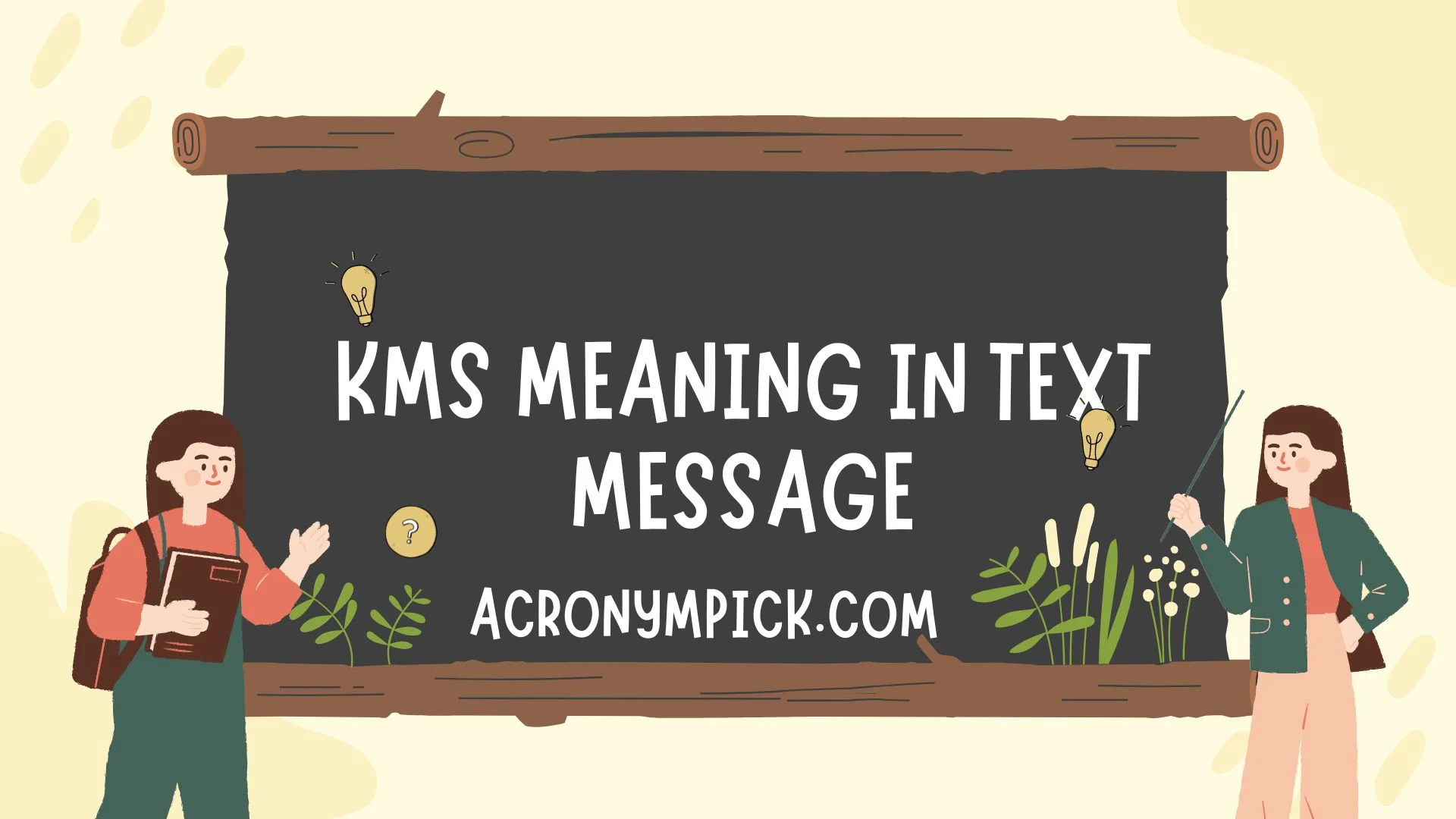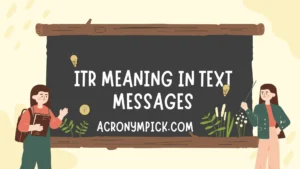In the world of texting, abbreviations are a quick and expressive way to communicate emotions, reactions, or even serious thoughts. One abbreviation that stands out—and sometimes causes concern—is KMS. If you’ve seen it in a message or social media comment and aren’t sure what it means, you’re not alone.
This article will help you understand the full meaning of KMS in text messages, including its different interpretations, emotional context, variations, and even how to respond. Whether you’re a parent, friend, or just curious about online slang, this guide is here to give you clarity.
Definitions & Meaning
The abbreviation KMS has different meanings depending on the context in which it is used. The most common interpretations include:
- “Kill Myself” – Often used in a joking or exaggerated way to express frustration, but can also indicate serious distress.
- “Keep Myself Safe” – A less common but positive alternative used in mental health discussions.
- Other meanings – In some contexts, KMS might stand for technical terms like Key Management Service (in IT) or Kilometers in measurement.
In texting, the most frequent usage is “Kill Myself”, but it’s important to consider context and tone when interpreting it.
Origins & History
The phrase “Kill Myself” (KMS) emerged as part of internet and text slang in the early 2010s. It became widely used in online chats, gaming, and social media to express frustration, embarrassment, or extreme annoyance.
However, due to its serious undertones, mental health advocates have encouraged people to be mindful of using it, as it can sometimes be a sign of real distress. The alternative meaning, “Keep Myself Safe”, was introduced in some circles to promote a more positive approach to emotional well-being.
Usage in Different Contexts
1. Expressing Frustration or Embarrassment (Common Usage)
Many people use KMS in a dramatic, non-serious way when they feel annoyed or embarrassed.
Example:
- Person 1: I just sent a message to my crush by accident!
- Person 2: Omg KMS, that’s so awkward!
2. Indicating Serious Emotional Distress (Warning Sign)
In some cases, KMS may be a sign that someone is struggling with mental health issues. If someone uses it in a concerning way, it’s important to check in on them.
Example:
- Person 1: I feel so alone. Nothing is getting better. KMS.
- Person 2: Hey, I’m here for you. Want to talk?
3. Keep Myself Safe (Alternative Meaning)
A positive way to use KMS is as “Keep Myself Safe”, particularly in mental health discussions.
Example:
- Person 1: I’ve been struggling, but I’m focusing on KMS.
- Person 2: That’s great! I’m proud of you.
4. Gaming or Social Media Slang
In online gaming or chats, KMS might be used humorously after a bad move or loss.
Example:
- Player 1: I just lost the match because I fell off the map.
- Player 2: Lol KMS, that was painful to watch.
5. Technical or Other Meanings
- Key Management Service (KMS): Used in IT and software licensing.
- Kilometers (KMS): Used in measurement, especially in travel or fitness.
Common Misunderstandings & Clarifications
- “KMS always means someone is suicidal.” – Not necessarily. Many people use it jokingly, but it’s important to be aware of context.
- “KMS is just harmless slang.” – While often used casually, it can sometimes indicate real distress. Always check in if someone seems serious.
- “KMS is only used by younger people.” – It’s common among teens and young adults, but it can appear in different online communities.
Alternatives & Synonyms
Depending on the meaning, here are some alternatives:
- For frustration: “FML” (F*** My Life), “UGH,” “I can’t”
- For positivity: “Stay strong,” “I got this,” “KMS (Keep Myself Safe)”
- For gaming slang: “GG” (Good Game), “RIP,” “Facepalm”
What Does KMS Mean in a Text Message?
KMS typically stands for “Kill Myself.” It’s often used dramatically or emotionally in casual conversations online or in texts to express frustration, sadness, or overwhelming emotion.
⚠️ Important Note: While often used as exaggeration, sometimes it can indicate a deeper emotional struggle.
🔍 Table 1: KMS – Quick Overview
| Term | Full Form | Tone of Use | Common Platforms |
|---|---|---|---|
| KMS | Kill Myself | Dramatic / Emotional / Dark Humor | Texts, TikTok, Twitter, Discord, Reddit |
Is KMS Always Serious? Understanding Emotional Context
While the phrase “Kill Myself” sounds alarming, it’s not always used literally. Here’s a breakdown of how KMS is typically used in different emotional contexts:
🟢 1. Dramatic or Exaggerated Reaction (Most Common)
Used to express embarrassment, stress, or cringe in a joking way.
- “I just tripped in front of my crush. KMS 😂”
🟡 2. Dark Humor or Memes
Popular among Gen Z and younger Millennials in meme culture.
- “Final exams tomorrow. KMS lmao.”
🔴 3. Serious or Concerning Messages
If used in serious tone or repeated often, it can be a cry for help.
- “I can’t handle this anymore… kms.”
If you see this in a serious or repeated way, check in with the person. Mental health matters.
🧠 Table 2: Emotional Context Breakdown
| Context Type | Meaning Behind KMS | Risk Level |
|---|---|---|
| Joking / Dramatic | Expressing cringe, failure, or embarrassment | Low |
| Meme / Dark Humor | Used with humor in social posts | Medium |
| Cry for Help | Sign of emotional distress | High (requires attention) |
Where Do People Use KMS in Text?
KMS appears in a variety of digital spaces where informal or emotional communication is the norm.
✅ Most Common Platforms:
- Snapchat: Used in private convos with friends.
- TikTok Comments: Often seen in reaction to awkward or funny videos.
- Twitter/X: Used in meme culture or emotional posts.
- Instagram DMs: Casual messages or reactions.
- Discord & Reddit: Sometimes seen in venting posts or sarcastic chat threads.
💬 Example Messages:
- “I sent that message to the wrong person. KMS 😭”
- “My mom saw my TikTok drafts… kms.”
- “That teacher gave us 4 assignments over break. KMS.”
Should You Be Concerned If Someone Texts KMS?
This depends entirely on tone, timing, and repetition.
📝 Ask Yourself:
- Is the person usually joking around?
- Are there signs of sadness or withdrawal?
- Have they used KMS seriously or repeatedly?
- Is it accompanied by other concerning behavior?
If there’s even a small chance it’s serious, it’s okay to check in. A simple “Hey, are you okay?” can go a long way.
🧩 Table 3: How to Respond to “KMS” Texts
| Tone of Message | Suggested Response | Why It Works |
|---|---|---|
| Casual / Joking | “LMAO chill 😂 you got this!” | Matches the tone and eases stress |
| Slightly Off | “Wait, fr? You good?” | Shows concern while being chill |
| Serious Concern | “Hey, I’m here if you need to talk 💬” | Opens up a safe space |
| Very Concerning | “I care about you. Want me to call?” | Direct, supportive, personal |
Variations & Related Slang Terms
KMS isn’t the only abbreviation that communicates emotional stress or exaggeration. Here are a few others commonly used in texts or online:
💬 Common Alternatives to KMS:
| Abbreviation | Full Form | Usage Context |
|---|---|---|
| KYS | Kill Yourself | Similar to KMS, sometimes used jokingly (⚠️ use with caution) |
| IDC | I Don’t Care | Used to express detachment |
| ILYSM | I Love You So Much | Often used to comfort someone |
| SMH | Shaking My Head | Reaction to something cringe or foolish |
| BRB Crying | Be Right Back Crying | Humorous overreaction |
⚠️ Note: Terms like KYS or KMS should always be treated with awareness—especially among teens or young adults.
How KMS Evolved: Meme Culture, Mental Health & Modern Language
KMS became popular in early 2010s meme culture, and has evolved in meaning over time.
- Originally started in dark humor forums and Tumblr posts
- Spread through TikTok trends and reaction memes
- Sometimes used in depression memes as a way of coping through humor
But here’s the twist:
While KMS is used jokingly, it reflects a generation that’s more open about mental health—using humor to mask stress, burnout, or sadness.
That’s why it’s important to understand the meaning AND emotional context behind the word—not just the letters.
KMS and Mental Health: When to Speak Up
Text slang like KMS highlights the need to check in on emotional wellbeing, especially with teens or young adults.
If someone is:
- Repeatedly using KMS seriously
- Isolating themselves
- Expressing hopelessness
- Making dark jokes too often
Then it’s time to talk, listen, or even recommend a mental health resource.
📞 Table 4: Helpful Mental Health Resources
| Resource Name | Website / Hotline | Purpose |
|---|---|---|
| National Suicide Prevention Lifeline | 988 (U.S.) | Free support 24/7 |
| Crisis Text Line | Text HOME to 741741 | Immediate text-based support |
| BetterHelp | www.betterhelp.com | Online therapy |
| Samaritans (UK) | 116 123 | Free, anonymous support line |
Frequently Asked Questions (FAQ)
1. What does KMS mean in texting?
It usually means “Kill Myself”, often used jokingly to express frustration or embarrassment.
2. Should I be concerned if someone texts KMS?
If it seems serious or they are showing signs of distress, it’s best to check in and offer support.
3. Is KMS always negative?
No, some people use it as “Keep Myself Safe” in a positive mental health context.
4. Can KMS mean something else?
Yes, in technical fields, it can stand for Key Management Service or mean Kilometers in measurement.5. How should I respond if someone says KMS?
If it’s casual, you can respond with humor. If it seems serious, show concern and support
Conclusion
The abbreviation KMS in text messages isn’t as simple as it seems. While it’s often used jokingly to express stress, frustration, or cringe, it can also hint at deeper emotional struggles—especially when used frequently or in a serious tone.
Understanding the meaning of KMS helps you:
- Read between the lines in digital conversations
- Identify whether someone’s joking or crying out for help
- Communicate more mindfully, especially with younger users
Words—no matter how short—carry weight. So next time you see KMS in a message, remember: context matters, and a thoughtful response can make a real difference.












